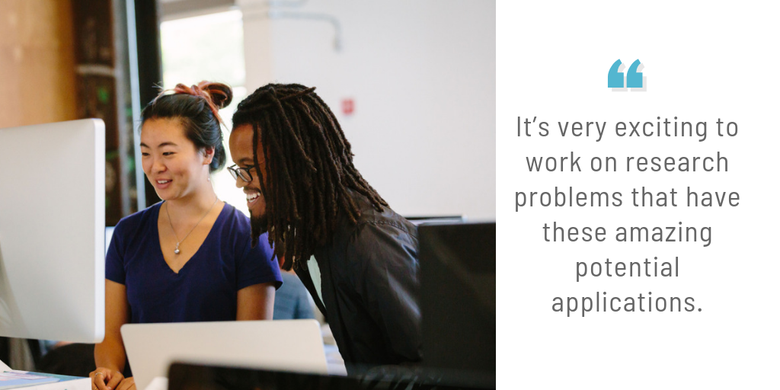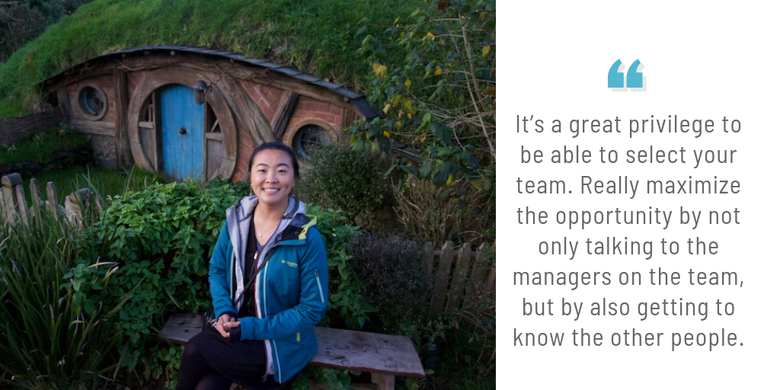Angela Fan—an artificial intelligence (AI) researcher at Facebook—is aware that most people don’t really understand what AI is, let alone what she does at work every day. Despite the frustrations that come with this reality, Fan’s really happy with the field she chose.
“It’s very exciting to work on research problems that have these amazing potential applications,” she says.
When Fan entered college, she had no idea she’d end up in AI. First, she thought she’d be a doctor or a nurse. Then, intrigued by public health and epidemiology, she chose statistics as her major. She quickly realized that learning how to code would help her “manipulate and analyze data more efficiently,” so she dove into computer science, too. This path led her to a data science internship, which she loved. So, she applied to be a data scientist at Facebook and got the role.
Shortly after joining Facebook, she learned about their AI research team. Excited by the work they were doing, she applied to transfer.
“I wasn’t very confident in my application, but thought that I should try anyway,” she shares. “I’m so glad that I did.”
To learn more about Fan’s experience and AI, keep reading.
What Is it Like to Transfer Teams?
At Facebook, people are encouraged to work on different teams. Actually, the main reason I wanted to join Facebook was the “boot camp” process—many people are hired for a general role, and can talk to different teams and try out various small tasks before they decide which group to join full-time.
As far as transferring teams goes, after working on your team for a year, employees can “hack-a-month” on another team to see what it’s like and to see if it’d be fun to join, so the process is pretty smooth.
My advice for anyone looking to do an internal transfer would be: It’s a great privilege to be able to select your team. Really maximize the opportunity by not only talking to the managers on the team, but by also getting to know the other people and asking them about their work, the team dynamic, and what project opportunities are available. Consider what you’d like to learn and if the team’s goals align with the areas you’d like to work on.
In Your Words, What Is Artificial Intelligence?
AI is the scientific field of trying to teach computers to think and make decisions like humans. Some examples at Facebook are automatic language translation, adding interactive effects to photos, ranking posts in your feed, and blocking offensive content.
One myth about AI is that it’s self-sufficient and can run entirely on its own. That’s just not true—AI today is about as smart as a cat or a dog. This isn’t to diminish the advancements so far, but we still have a long way to go. There’s also the misconception that it’s ready to replace human jobs. But in general, AI complements people and their work. For example, AI could help doctors detect cancerous cells in medical images more quickly, leaving doctors with more time to help you with the treatment plan and recovery.
What’s a Typical Work Day Like for You?
In the morning, I often attend a research talk or “reading meeting,” where different people present work they’ve been doing or reading about. Afterward, I respond to emails, read a scientific paper, and check in on my “experiments”—different ideas for algorithms—to see how successful they are.
After lunch with my team, I’m heads-down coding and setting up more experiments. I dedicate Thursday afternoons to meeting with interns, overseeing projects I advise, and attending my own project meetings where we discuss ongoing results and share ideas for what we might want to try next. I like to leave a lot of time for these brainstorming sessions because you never know what you might think of if you keep discussing.
Any Specific Projects You’re Working on Right Now That Excite You?
I broadly work on text generation, which focuses on how we can improve models that write text. One use of this is translation. For example, the model will read a French sentence and, while reading the French words, write the corresponding English translation.
A project I’m working on right now is to use the algorithms that power translation models and apply them to creative tasks such as writing short stories. The goal is to create models that can take a premise (e.g., a story about a superhero) and write a paragraph or two about it. It’s a very interesting research problem because most text generation tasks focus on sentences, not paragraphs. Creating algorithms that can write several sentences that actually make sense together is challenging!
Full disclosure: Facebook is a current client of The Muse.



